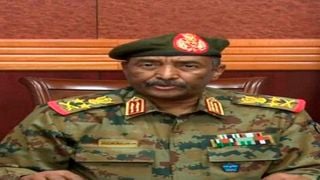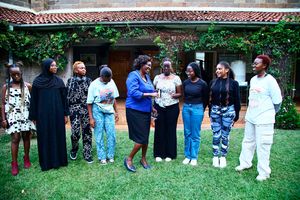
This grab taken from Sudan TV shows army general Abdel Fattah al-Burhan addressing the Sudanese people on October 25, 2021.
| Sudan TV | AFPAfrica
Premium
Sudan coup: Aide claims military humiliated ministers during arrest
A senior aide to the Sudanese cabinet on Monday claimed the country’s military humiliated the ministers by arresting them early in the morning in their pyjamas.
And as the US, Sudan’s main donor in this transition period, announced suspension of $700 million worth of aid to Khartoum, details emerged of how the military went for the cabinet before daybreak.
Abdel-Monim Eljak, until Monday, a senior advisor to the Minister for Cabinet Affairs Khaled Omar, said his bosses were not even allowed to wash their faces as the soldiers picked them one by one from their residences in the morning.
The four Cabinet Ministers in charge of Industry (Ibrahim al-Sheikh), information (Hamza Baloul), cabinet affairs and communications (Faisal Mohammed Saleh) as well as spokesman for the transitional sovereign council (Mohammed Suliman) were picked up alongside Prime Minister Abdalla Hamdok and his wife, and shipped to unknown location in the capital Khartoum.
The arrests were quickly followed by a declaration of a state of emergency and the restriction of internet and telephone services in the country.
“They were not given any time to even change their clothes. They were picked up like street dogs,” Eljak told Nation. Africa.
Dictatorship
“They want to take the country back to the dictatorship era of Omar al-Bashir. They are not happy with the country’s transition because it will seek justice for the past atrocities they were a part of,” he told Nation.Africa on phone on Monday, asking the African Union and the Un Security Council to crack the whip on the military.
The Military under Abdel Fattah al-Burhan, who had led the now dissolved Sovereign Council later announced they had dissolved Hamdok’s government. Lt-Gen al-Burhan cited divisions in the transitional government as reasons for the dissolution. But this rift has been traced back to last month when an attempted coup, attributed to loyalists of former leader Omar al-Bashir, were tamed but the divisions ensued between the military component of the transitional government and the civilian officials they shared power with.
By Monday evening, the fate of Dr Hamdok and his officials was still unknown. And neither was it clear whether Bashir, now in jail for corruption, could profit from the chaos.
The coup quickly received condemnation from both regional and international organisations. Regional bloc, Intergovernmental Authority on Development (IGAD) said it rejected the unconstitutional change of power.
IGAD Executive Secretary Workneh Gebeyehu said he “strongly condemns any attempt to undermine the transitional Government and calls for the immediate release of Prime Minister Abdalla Hamdok and all the political leaders detained this morning.”
Hamdok had been the Chairman of IGAD, a rotational seat between the seven-member bloc that is supposed to handle security and development crises. African Union Commission Chairperson Moussa Faki Mahamat said he was ‘dismayed’ by the events in Khartoum.
“The Chairperson calls for the immediate resumption of consultations between civilians and military within the framework of the Political Declaration and the Constitutional Decree,” the AU said of the transitional programme in Sudan, which may now be in jeopardy.
“The Chairperson reaffirms that dialogue and consensus is the only relevant path to save the country and its democratic transition.” As is tradition, the AU was expected to suspend Sudan from its formal sittings, denying it a vote until they resume transition to civilian rule.
Transition
There were no indications, however, that Hamdok’s government would be returned, although al-Burhan did not openly declare an end to the transition, which would have seen elections held by the end of 2023.
On Monday evening, Washington said it was pausing aid to Sudan, as a penalty for the coup.
“The civilian-led transitional government should be immediately restored because it represents the will of the Sudanese people,” said Ned Price, the Spokesperson for the Department of State in a press briefing on Monday.
The US said it was surprised by the coup, just a day after US Special Envoy for the Horn of Africa Jeffrey Feltman left Khartoum after prevailing upon the parties to hold dialogue and save the transition.
“To be clear, we did not receive any heads-up about this. Clearly, an action like this is something that the United States would, and now does, condemn in the strongest terms possible,” Mr Price added, warning the spoilers will be held accountable.
The events in Khartoum were also shaking its neighbourhood.
“This particularly emanates from the strong brotherly ties that have existed between the peoples of the two countries for centuries,” Ethiopia’s Foreign Ministry said in a statement.
“It will be recalled that the Ethiopian Government has played a significant role in successfully mediating the establishment of a coalition government, consisting of its civilian and military components, and adopting the constitutional document of the transitional period.
Civilian protests
When Bashir was toppled in April 2019 following civilian protests, Ethiopian Prime Minister Abiy Ahmed helped broker a power-sharing agreement that saw Dr Hamdok become the new Sudanese Prime Minister. But Abiy and Sudan had gone on to bicker over an age-old border tiff between them.
Nonetheless, Addis Ababa called on all Sudanese parties for calm and de-escalation and to exert every effort towards a peaceful settlement to end the crisis.
“Ethiopia reiterates the need for the respect of the sovereign aspirations of the people of Sudan and the non-interference of external actors in the internal affairs of Sudan,” it said.
Meanwhile, South Sudan’s President Salva Kiir appealed to protesting Sudanese and the coup plotters to dialogue in a move towards achieving a stable and peaceful Sudan, according to his Foreign Affairs Ministry.
“South Sudan is keenly following the unfolding political tensions within the ruling coalition in our sisterly Republic of Sudan. President Kiir, on behalf of the South Sudanese people, affirms our unwavering solidarity with Sudan.
“In building the Coalition, Sudan has shown the world that Africans can and will solve their problems from within. For that, the Government and People of Sudan have our utmost respect as fellow Africans” said Kiir.
South Sudan, once a part of Sudan before seceding in 2011, still has an unfinished border to demarcate with Sudan. It has recently been involved in mediations to convince armed groups in Sudan to join the transitional government. The coup may delay the peace deals.
Additional reporting by David Mayen






